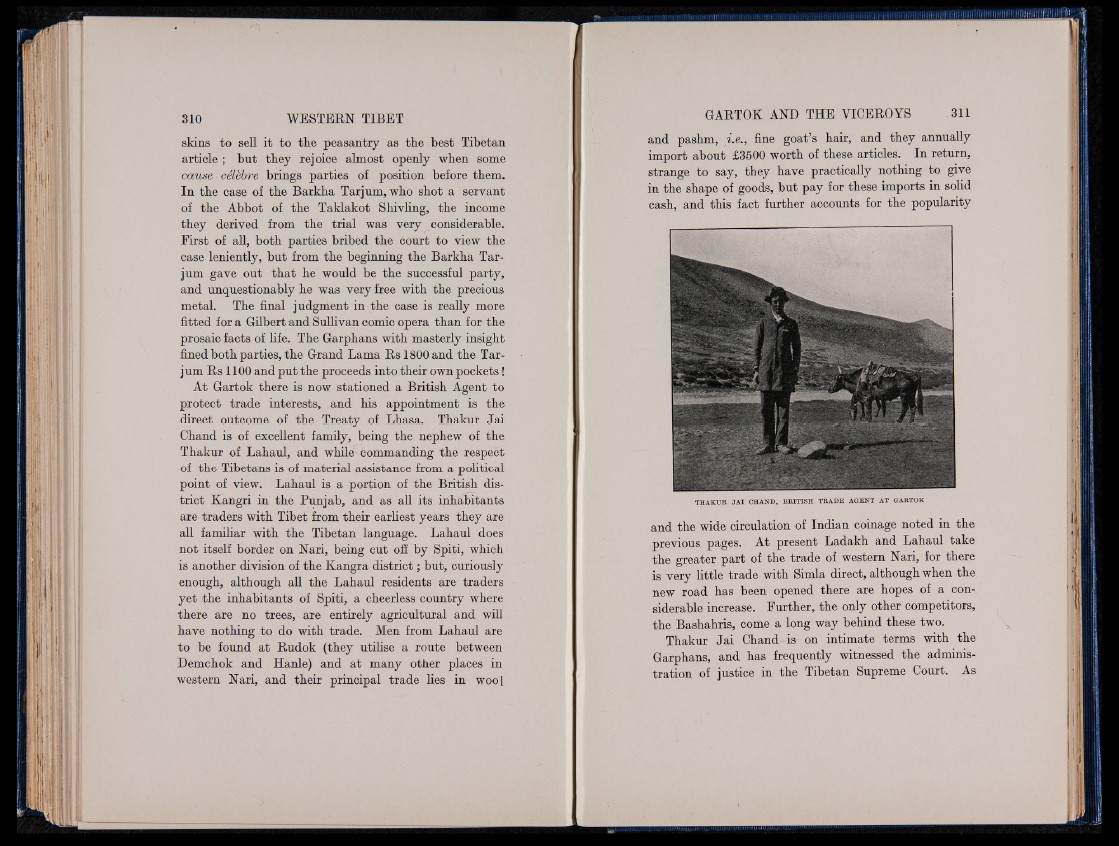
skins to sell it to the peasantry as the best Tibetan
article ; but they rejoice almost openly when some
cause célèbre brings parties of position before them.
In the case of the Barkha Tarjum,who shot a servant
of the Abbot of the Taklakot Shivling, the income
they derived from the trial was very considerable.
First of all, both parties bribed the court to view the
case leniently, but from the beginning the Barkha Tar-
jum gave out that he would be the successful party,
and unquestionably he was very free with the precious
metal. The final judgment in the case is really more
fitted for a Gilbert and Sullivan comic opera than for the
prosaic facts of fife. The Garphans with masterly insight
fined both parties, the Grand Lama Rs 1800 and the Tar-
jum Rs 1100 and put the proceeds into their own pockets !
At Gartok there is now stationed a British Agent to
protect trade interests, and his appointment is the
direct outcome of the Treaty of Lhasa. Thakur Jai
Chand is of excellent family, being the nephew of the
Thakur of Lahaul, and while commanding the respect
of the Tibetans is of material assistance from a political
point of view. Lahaul is a portion of the British district
Kangri in the Punjab, and as all its inhabitants
are traders with Tibet from their earliest years they are
all familiar with the Tibetan language. Lahaul does
not itself border on Nari, being cut off by Spiti, which
is another division of the Kangra district ; but, curiously
enough, although all the Lahaul residents are traders
yet the inhabitants of Spiti, a cheerless country where
there are no trees, are entirely agricultural and will
have nothing to do with trade. Men from Lahaul are
to be found at Rudok (they utilise a route between
Demchok and Hanle) and at many otJier places in
western Nari, and their principal trade lies in wool
and pashm, i.e., fine goat’s hair, and they annually
import about £3500 worth of these articles. In return,
strange to say, they have practically nothing to give
in the shape of goods, but pay for these imports in solid
cash, and this fact further accounts for the popularity
THAKUR JA I CHAND, BR IT ISH TRADE AGENT AT GARTOK
and the wide circulation of Indian coinage noted in the
previous pages. At present Ladakh and Lahaul take
the greater part of the trade of western Nari, for there
is very little trade with Simla direct, although when the
new road has been opened there are hopes of a considerable
increase. Further, the only other competitors,
the Bashahris, come a long way behind these two.
Thakur Jai Chand is on intimate terms with the
Garphans, and has frequently witnessed the administration
of justice in the Tibetan Supreme Court. As